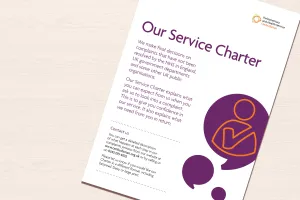This section explains how we deal with complaints. There are three steps.
Step 1 When we first receive a complaint
When we first receive a complaint, we look at it to decide if it is a complaint that we can investigate.
We check:
Whether it is appropriate for us to investigate the complaint
We have to make sure that it's about an organisation and issue we can look into. We also have to make sure there isn't another organisation better placed to deal with the issue such as a regulator.
Whether the complaint has been properly made
We have to check that the complaint has been made to us in writing. For a complaint about a government department, we have to make sure that it has been referred to us by an MP.
Whether you have given a final response
At this stage, we may contact you to find out if you have received the complaint and what stage it's at. It's important we check that your organisation has already given a final response to the complaint.
If these initial checks show that we can investigate, we then assess the complaint in more detail to decide if we should investigate.
Step 2 Deciding if we can investigate a complaint
To help us decide if we can investigate a complaint, we look at:
The timing of the complaint
Usually, we cannot investigate a complaint if a person brought it to us more than a year after they became aware of the problem. For complaints about UK government departments and other UK public organisations, we can usually only look into these if a person referred the complaint to their MP within a year of becoming aware of the complaint.
Whether it is or was reasonable for the person to take legal action to resolve their complaint
This could include going to court or a tribunal for instance. We decide this by considering:
- Does the person have a case that it is possible for a court to decide on?
- Is it reasonable? Considering the person's circumstances, is it reasonable to expect the person to go to court? Does the person have enough money to take legal action?
Whether someone has experienced an injustice or hardship
We try to find out if an organisation has not acted properly or fairly or has provided a poor service (the terms we use for this are maladministration and service failure) and if this has caused an injustice or hardship for the complainant.
How your organisation has already dealt with the complaint
We find out what action you have already taken to put things right. We will contact the complainant to discuss any action you took and ask what they remain unhappy about.
Sometimes we can resolve the complaint quickly without the need for a full investigation. For example, we may contact your organisation to discuss the complaint and agree an appropriate way of addressing it, such as an apology.
What is injustice?
We define an injustice as a negative impact on someone's life as a result of an organisation's actions. For example, a hospital failed to diagnose a man with cancer until he was at the end of his life. The hospital didn't tell his family about the diagnosis for another week. The family suffered an injustice because their loved one died soon after they found out about his diagnosis. This meant they didn't have time to say goodbye to him properly or make sure he received the end of life care they would have wanted for him.
What is hardship?
A hardship could be someone not having access to basic amenities or means of support as a result of service failure. For example, a person who had their Jobseeker's Allowance payments stopped may have experienced a hardship because they had less financial support.
Step 3 What happens if we investigate a complaint
If we decide to investigate a complaint about your organisation, we will contact you as soon as possible to let you know.
We will then send a broad summary of the complaint to you and the complainant and give you the opportunity to comment if you wish to. You don't have to comment but if you decide to, you won't need to go over information you've already given us.
It would be helpful for us to know:
- If you think there is more you could do to resolve the complaint locally.
- If there has been any change in your organisation that is relevant to the complaint.
Following this, the case will be passed to an investigator and they will look at it in detail using available evidence, the summary of complaint and any comments received. They will put together a plan for the investigation then discuss this with you and the complainant, to make sure you understand the scope of the investigation. At this point you will be given an idea of timescales and what information we will need to carry out a thorough investigation.
When our investigation is underway
We will start by gathering evidence we need from you. We may have to interview your staff to help us understand what should have happened, what actually did happen and, if possible, why the events in the case unfolded as they did. Most of our interviews are for fact-finding purposes and may be face-to-face or by phone. We will arrange a suitable time for these with you in advance.
To help us fully understand the issues and make the right decision we may have to seek peer advice from healthcare professionals using the Ombudsman's Clinical Standard, or from our own legal team.
We also refer to our Complaint Standards, Good Administration and Remedy to establish what should have happened against what actually happened.
We will give you regular updates about what we have done so far, what information we have gathered and what that information tells us. We will also let you know when we think we'll finish our investigation.
Once we start an investigation we aim to complete the majority within three to six months, but some complex cases can take longer. We will let you know the expected timescales, and will keep you updated regularly throughout the investigation.
When we complete our investigation
Towards the end of our investigation, we'll send you and the person who made the complaint our draft report on our investigation.
This will include our provisional views and recommendations on the complaint and how we think your organisation can put things right. We will give you and the person who made the complaint the opportunity to comment on our proposed decision and what we have said in the report. For example you may want to comment if:
- we have not explained our decision clearly or if something needs more detail
- we have got any of the facts wrong or have missed anything
- there is new information we have not yet looked at
- you think we have not taken the right steps to fairly investigate the complaint.
We usually give organisations we are investigating two weeks to respond to our findings but if you need longer than this, you should let us know.
There is also an opportunity for your organisation and the complainant to feed back on the proposed outcomes and recommendations.
We will look at any comments you and the complainant give us to see whether we need to do more work before we finalise our decision on the complaint.
We can decide to fully uphold, partly uphold or not uphold the complaint.
Fully uphold
This could mean we found that:
- your organisation made mistakes or provided a poor service that amounted to maladministration or service failure and
- this has had a negative impact on an individual which has not yet been put right.
Partly uphold
We might partly uphold a complaint if:
- we found that your organisation got some things wrong, but not all the issues that were complained about or
- the mistakes made did not have a negative effect on anyone.
Not upheld
This could mean we found:
- your organisation acted correctly in the first place or
- your organisation made mistakes but you have already done what we would expect to put things right for the person or people affected.


